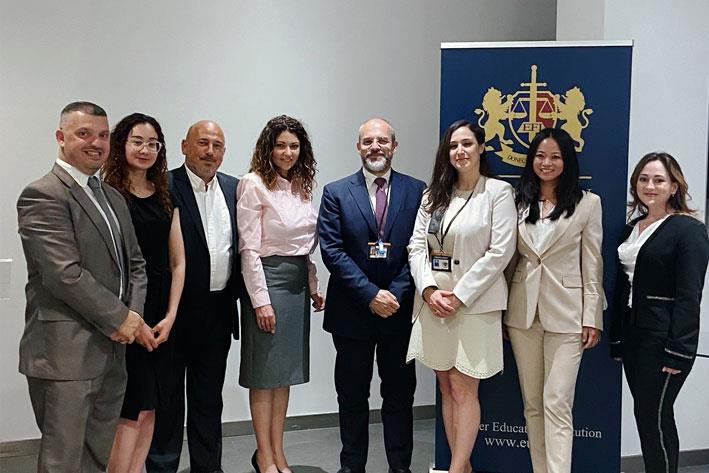The European Forensic Institute was inaugurated in 2018 and is accredited by the Malta Further and Higher Education Authority (MFHEA). It offers a selection of higher-education qualifications in specialist areas, and its first collaboration with the Malta Police Force saw the creation of a forensic biology course specifically for police officers serving in Malta.
Officer Cassandra Borg Muscat, Caroline Meilak, and Mark Farrugia are the first police officers in the country to pass the course. Their award ceremony was attended by Head of the Institution Andreas Melinato, Minister for Justice Dr Jonathan Attard, Host and member of academic staff, Frankline Lauria, and friends, colleagues, and family members.

Melinato spoke of the need to strike a balance between academic rigour, ongoing professional life, and international best standards, as well as the wish to further develop the area of forensic sciences in Malta.
"Our mission is to create a hub for forensic and investigative sciences, centered here in Malta, to bring together experts, professionals, and students to collaborate, teach, learn, and innovate in this highly important and pertinent sector," he said.
He added that the ambitions of the Institute mirror the UN Sustainable Development Goals, in particular quality education, peace, justice, and strong institutions and partnerships.
"We MUST continue to collaborate - to bridge the gap, not only between academia and the profession, but also across ALL the increasingly interconnected and continuously advancing sectors ranging from natural sciences, criminology and profiling to engineering, digital forensics, IT, and today's complex business and financial systems," he continued.
The Forensic Biology award was formulated with an emphasis on quality and the needs of modern policing. Drawing on international best practices while adapting them to local laws and specifically Maltese police, officers have not only broadened their skill set but have taken an important collaborative step.
"This Award in collaboration with the Malta Police Forensic Science Laboratory is a highly important first step forward towards our increasing collaboration. A mutual relationship which I know will only continue to strengthen," Melinato said, adding that, "myself and our highly experienced team of Academic Staff from across all sectors, some of whom are here with us today, are ready to take on the continued challenges in bridging the gap to support our shared values."
Wrapping up his speech, Melinato said that in addition to the two BSc courses on offer and the police-only course, two master's qualifications are currently undergoing accreditation by the MFHEA.
Addressing those in attendance, Minister Attard praised the collaboration between the institute and the Malta police force and said he is sure it is the first of much more to come.
"This is a reflection of our commitment as a government to provide the necessary tools and space in a state of the art of the environment. We must strive to continue having such fruitful collaboration between the Malta police force and the European Forensic Institute," he said.
Attard added that the completion of this course by the officers and continued learning opportunities will form an important part of the Maltese justice system.
In her address, Lauria spoke of how the journey from the start of the collaboration to today, the award ceremony of its first students, has been particularly engaging and gave those in attendance insight into what the course consisted of.
"The theoretical knowledge conveyed was adapted and made relevant to the work environment experienced by the students. The laboratory sessions then offered tangible and practical familiarity on some of the hands-on topics covered in the academic sessions," she said.
She continued that the course material covered various topics within the field of Forensic Biology and explored how forensic evidence processed by scientific techniques should be documented and processed not to violate admissibility in court.
A distinct takeaway of the course is "the importance of having robust legislation and a harmonious judiciary system which will support the scientific techniques by which forensic evidence is processed," Lauria said. She added that the use of databases, DNA Analysis, and the need to keep personnel up to date with the latest technologies were essential going forward.
Last but not least, gratitude was extended to Dr Manuele Biazzo, a guest lecturer from BioArte. He held two practical sessions throughout the preparation of the course, and his invaluable contribution was applauded by those involved.
The European Forensic Institute was founded in 2018 and is accredited by the Malta Further and Higher Education Authority (MFHEA) with license number 2018-014. They operate a
state-of-the-art higher education institution at the Malta Life Sciences Park, where they conduct in-presence and laboratory-based sessions.
The Institute currently offers two BScs in Forensic Science and Criminology and Psychology and two master's programmes currently undergoing accreditation from the MFHEA; A Masters in Business Management, Financial Crime and Digital Technologies, and another in Cyber Security, Digital Forensics, and Crime Analysis.